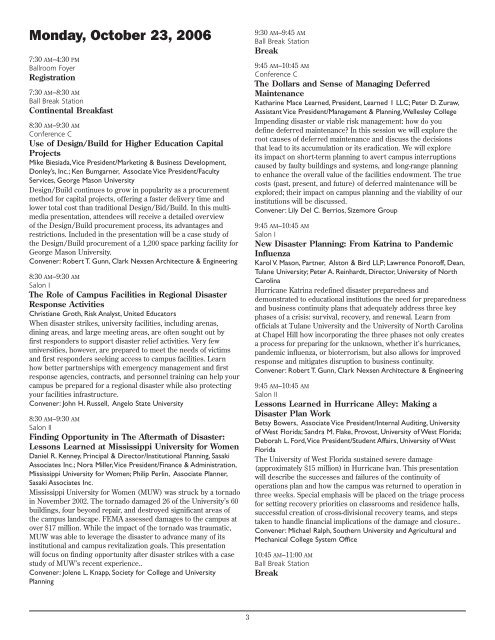Disaster Relief: How Do You Prepare for the Unknown? - Society for ...
Disaster Relief: How Do You Prepare for the Unknown? - Society for ...
Disaster Relief: How Do You Prepare for the Unknown? - Society for ...
You also want an ePaper? Increase the reach of your titles
YUMPU automatically turns print PDFs into web optimized ePapers that Google loves.
Monday, October 23, 2006<br />
7:30 am–4:30 pm<br />
Ballroom Foyer<br />
Registration<br />
7:30 am–8:30 am<br />
Ball Break Station<br />
Continental Breakfast<br />
8:30 am–9:30 am<br />
Conference C<br />
Use of Design/Build <strong>for</strong> Higher Education Capital<br />
Projects<br />
Mike Biesiada, Vice President/Marketing & Business Development,<br />
<strong>Do</strong>nley’s, Inc.; Ken Bumgarner, Associate Vice President/Faculty<br />
Services, George Mason University<br />
Design/Build continues to grow in popularity as a procurement<br />
method <strong>for</strong> capital projects, offering a faster delivery time and<br />
lower total cost than traditional Design/Bid/Build. In this multimedia<br />
presentation, attendees will receive a detailed overview<br />
of <strong>the</strong> Design/Build procurement process, its advantages and<br />
restrictions. Included in <strong>the</strong> presentation will be a case study of<br />
<strong>the</strong> Design/Build procurement of a 1,200 space parking facility <strong>for</strong><br />
George Mason University.<br />
Convener: Robert T. Gunn, Clark Nexsen Architecture & Engineering<br />
8:30 am–9:30 am<br />
Salon I<br />
The Role of Campus Facilities in Regional <strong>Disaster</strong><br />
Response Activities<br />
Christiane Groth, Risk Analyst, United Educators<br />
When disaster strikes, university facilities, including arenas,<br />
dining areas, and large meeting areas, are often sought out by<br />
first responders to support disaster relief activities. Very few<br />
universities, however, are prepared to meet <strong>the</strong> needs of victims<br />
and first responders seeking access to campus facilities. Learn<br />
how better partnerships with emergency management and first<br />
response agencies, contracts, and personnel training can help your<br />
campus be prepared <strong>for</strong> a regional disaster while also protecting<br />
your facilities infrastructure.<br />
Convener: John H. Russell, Angelo State University<br />
8:30 am–9:30 am<br />
Salon II<br />
Finding Opportunity in The Aftermath of <strong>Disaster</strong>:<br />
Lessons Learned at Mississippi University <strong>for</strong> Women<br />
Daniel R. Kenney, Principal & Director/Institutional Planning, Sasaki<br />
Associates Inc.; Nora Miller, Vice President/Finance & Administration,<br />
Mississippi University <strong>for</strong> Women; Philip Perlin, Associate Planner,<br />
Sasaki Associates Inc.<br />
Mississippi University <strong>for</strong> Women (MUW) was struck by a tornado<br />
in November 2002. The tornado damaged 26 of <strong>the</strong> University’s 60<br />
buildings, four beyond repair, and destroyed significant areas of<br />
<strong>the</strong> campus landscape. FEMA assessed damages to <strong>the</strong> campus at<br />
over $17 million. While <strong>the</strong> impact of <strong>the</strong> tornado was traumatic,<br />
MUW was able to leverage <strong>the</strong> disaster to advance many of its<br />
institutional and campus revitalization goals. This presentation<br />
will focus on finding opportunity after disaster strikes with a case<br />
study of MUW’s recent experience..<br />
Convener: Jolene L. Knapp, <strong>Society</strong> <strong>for</strong> College and University<br />
Planning<br />
9:30 am–9:45 am<br />
Ball Break Station<br />
Break<br />
9:45 am–10:45 am<br />
Conference C<br />
The <strong>Do</strong>llars and Sense of Managing Deferred<br />
Maintenance<br />
Katharine Mace Learned, President, Learned 1 LLC; Peter D. Zuraw,<br />
Assistant Vice President/Management & Planning, Wellesley College<br />
Impending disaster or viable risk management: how do you<br />
define deferred maintenance In this session we will explore <strong>the</strong><br />
root causes of deferred maintenance and discuss <strong>the</strong> decisions<br />
that lead to its accumulation or its eradication. We will explore<br />
its impact on short-term planning to avert campus interruptions<br />
caused by faulty buildings and systems, and long-range planning<br />
to enhance <strong>the</strong> overall value of <strong>the</strong> facilities endowment. The true<br />
costs (past, present, and future) of deferred maintenance will be<br />
explored; <strong>the</strong>ir impact on campus planning and <strong>the</strong> viability of our<br />
institutions will be discussed.<br />
Convener: Lily Del C. Berrios, Sizemore Group<br />
9:45 am–10:45 am<br />
Salon I<br />
New <strong>Disaster</strong> Planning: From Katrina to Pandemic<br />
Influenza<br />
Karol V. Mason, Partner, Alston & Bird LLP; Lawrence Ponoroff, Dean,<br />
Tulane University; Peter A. Reinhardt, Director, University of North<br />
Carolina<br />
Hurricane Katrina redefined disaster preparedness and<br />
demonstrated to educational institutions <strong>the</strong> need <strong>for</strong> preparedness<br />
and business continuity plans that adequately address three key<br />
phases of a crisis: survival, recovery, and renewal. Learn from<br />
officials at Tulane University and <strong>the</strong> University of North Carolina<br />
at Chapel Hill how incorporating <strong>the</strong> three phases not only creates<br />
a process <strong>for</strong> preparing <strong>for</strong> <strong>the</strong> unknown, whe<strong>the</strong>r it’s hurricanes,<br />
pandemic influenza, or bioterrorism, but also allows <strong>for</strong> improved<br />
response and mitigates disruption to business continuity.<br />
Convener: Robert T. Gunn, Clark Nexsen Architecture & Engineering<br />
9:45 am–10:45 am<br />
Salon II<br />
Lessons Learned in Hurricane Alley: Making a<br />
<strong>Disaster</strong> Plan Work<br />
Betsy Bowers, Associate Vice President/Internal Auditing, University<br />
of West Florida; Sandra M. Flake, Provost, University of West Florida;<br />
Deborah L. Ford, Vice President/Student Affairs, University of West<br />
Florida<br />
The University of West Florida sustained severe damage<br />
(approximately $15 million) in Hurricane Ivan. This presentation<br />
will describe <strong>the</strong> successes and failures of <strong>the</strong> continuity of<br />
operations plan and how <strong>the</strong> campus was returned to operation in<br />
three weeks. Special emphasis will be placed on <strong>the</strong> triage process<br />
<strong>for</strong> setting recovery priorities on classrooms and residence halls,<br />
successful creation of cross-divisional recovery teams, and steps<br />
taken to handle financial implications of <strong>the</strong> damage and closure..<br />
Convener: Michael Ralph, Sou<strong>the</strong>rn University and Agricultural and<br />
Mechanical College System Office<br />
10:45 am–11:00 am<br />
Ball Break Station<br />
Break
















